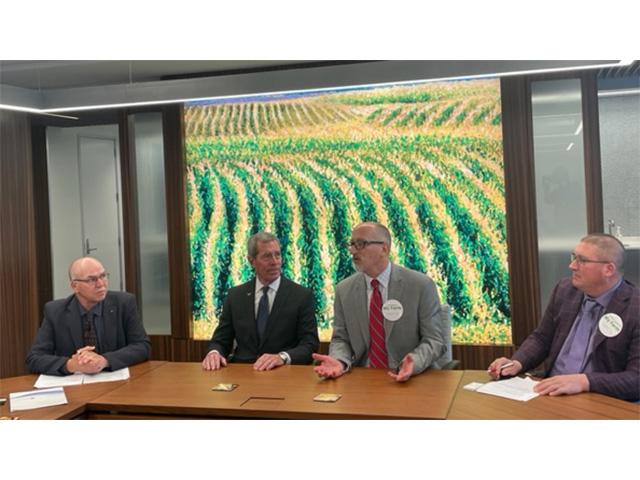Ag Frustration Over Lack of Trade Talks
Ag Leaders Campaign for Foreign Market Access, New Trade Deals
WASHINGTON (DTN) -- Citing a USDA report forecasting a decline in U.S. farm exports and rising imports, a group of farmers and agribusiness executives under the banner of Farmers for Free Trade met this week with about 50 senators and House members to tell them the U.S. government needs to get more market access for U.S. agricultural products in foreign countries.
Brian Kuehl, executive director of Farmers for Free Trade, told reporters at a briefing Thursday it has been more than 10 years since the United States signed a new free-trade agreement. Still, other countries continue to sign new free-trade deals without any participation from the U.S.
"Farmers are frustrated," Kuehl said. "Competitors are opening new markets."
But he said, with the confirmations of Doug McKalip as the chief agricultural negotiator in the Office of the U.S. Trade Representative and Alexis Taylor as agriculture undersecretary for trade and foreign agricultural affairs, and the arrival of new members of Congress, "We feel there is a new window that is open."
Kuehl said 22 members of Farmers for Free Trade, some based in Washington and others who flew in from around the country, met about 50 senators and representatives, most of whom serve on the House and Senate Agriculture committees and the committees that oversee trade, House Ways and Means and Senate Finance. Kuehl said a delegation will meet with Taylor at USDA today.
Members of the Senate Agriculture Committee on Wednesday expressed some frustration over the Biden administration's lack of movement on new trade deals and market access as well.
"I'm concerned about this administration's lack of attention to expanding market access for U.S. agricultural products," Sen. John Thune, R-S.D., told Taylor at the hearing.
With both parties vying for the votes of working-class Americans, many of whom believe free trade has damaged American manufacturing, neither President Biden nor President Trump favored new trade agreements. The U.S.-Mexico-Canada Agreement on trade (USMCA) did revise the North American Free Trade Agreement (NAFTA) during the Trump administration, but it did not provide more market access.
P[L1] D[0x0] M[300x250] OOP[F] ADUNIT[] T[]
But Doug Chapin, a Michigan dairy farmer, told the reporters that even members from districts that have lost manufacturing jobs indicated an openness to discussing the need for more market access for U.S. agricultural products.
Bob Hemesath, an Iowa corn farmer, said opening new markets is important because "everyone is feeling the effects of higher inflation."
John Bode, president and CEO of the Corn Refiners Association, pointed out that the processing and packaging of agricultural products is manufacturing that creates a million jobs.
The agricultural leaders were not specific about what countries could provide markets for U.S. agricultural products, but cited the United Kingdom, Kenya, Southeast Asia and India as possibilities.
They also said the Biden administration and lawmakers should be careful about "decoupling" from China so that U.S. agricultural exports to China are not hurt. China is the biggest buyer of U.S. agricultural products.
Farmers for Free Trade supported the TransPacific Partnership, from which Trump withdrew, and supports the United States joining the successor organization that has been established without U.S. participation, Kuehl and Bode said.
In 2016, both Hillary Clinton, the Democratic presidential candidate, and Trump expressed opposition to TPP. Asked whether Farmers for Free Trade would get involved in the 2024 presidential campaigns and the development of party platforms, Bode said the current effort is only the beginning of educating the public on trade.
The Farmers for Free Trade leaders said the group supports the Indo-Pacific Economic Framework for Prosperity the Biden administration has launched with Asian countries to deal with issues such as nontariff barriers and corruption, but they believe a program to achieve more market access through tariff reductions is also necessary.
Launching trade agreements that would lead to market access would require trade promotion authority before the executive branch could negotiate those agreements and President Biden has not shown any interest in asking Congress for that authority.
Kuehl noted that the Constitution puts Congress in charge of international trade and suggested Congress should initiate the process of granting the executive branch trade promotion authority.
Following the fly in, "We have a hint of optimism and hope in the next two years we will see progress," Kuehl said.
DTN Ag Policy Editor Chris Clayton contributed to this report.
-USDA Economic Research Service and Foreign Agricultural Service -- U.S. Agricultural Exports in Fiscal Year 2023 Forecast at $190.0 Billion; Imports at $199.0 Billion https://www.ers.usda.gov/…
Also see, "Senators Press USDA Official on Conflict With Mexico Over Biotech Corn," https://www.dtnpf.com/…
Jerry Hagstrom can be reached at jhagstrom@nationaljournal.com
Follow him on Twitter @hagstromreport
(c) Copyright 2023 DTN, LLC. All rights reserved.




